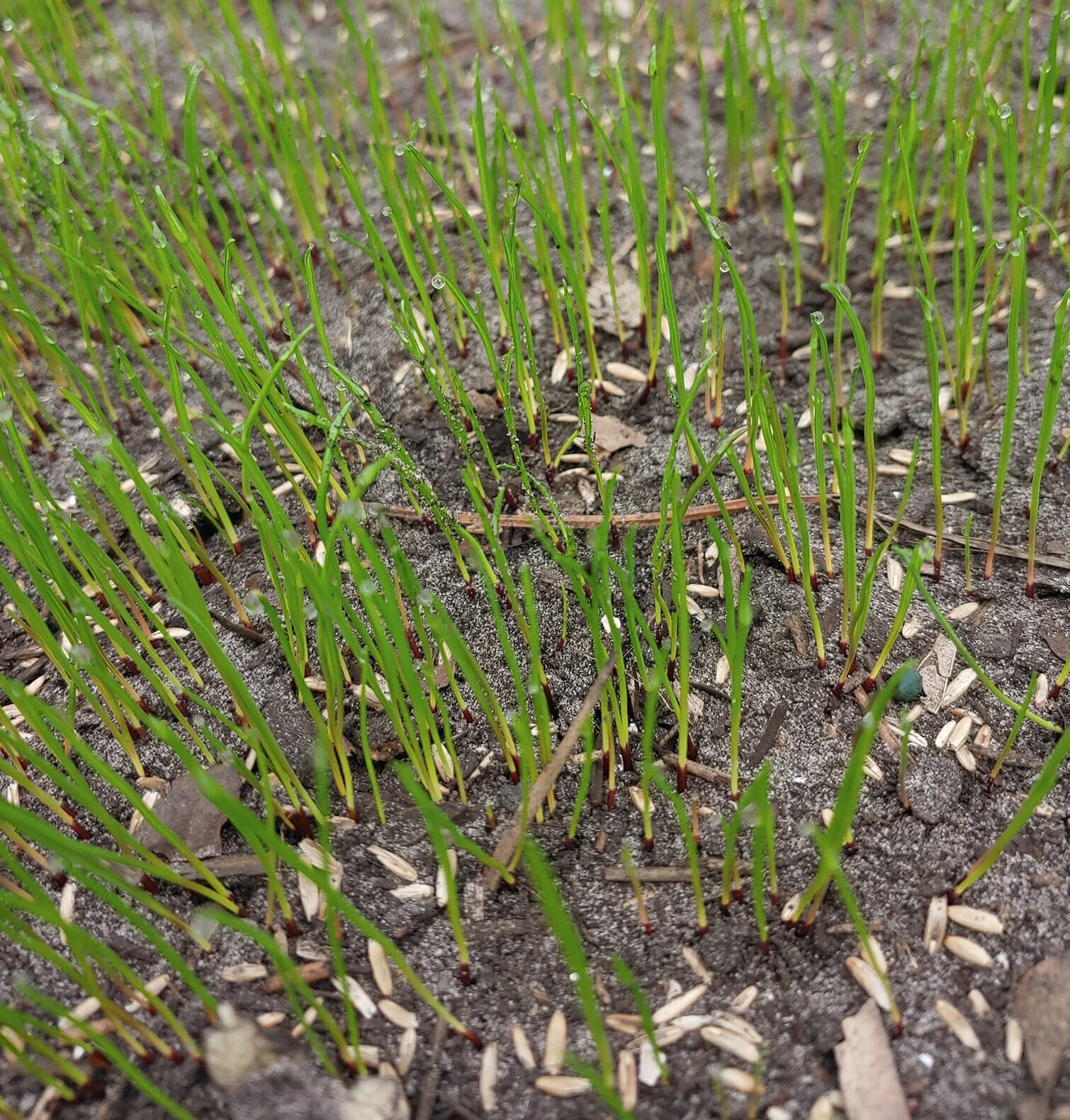Without water, the effort and money you put into planting new grass seeds on your lawn will be futile.
Proper watering will help transform your otherwise bland-looking yard into a tiny paradise in your home with lush green grass, but you must know how long and how much water your new lawn will need.
You should water your new grass seeds 2 to 3 times every day for approximately 5-10 minutes, translating to the soil having 3 to 4 inches of water every week.
Once the seedlings germinate, cut the watering times to 2-3 days weekly, but let the water soak in for about 40 minutes.
Watering your lawn sounds like a simple task, but if you don’t follow the recommendations of gardening experts, you might end up underwatering or overwatering your grass.
Well, in that case, let’s find out what you need to know to ensure your new grass seeds have sufficient moisture.
Best Time To Water New Grass Seed
The most suitable time to water your new grass seeds is early in the morning anywhere between 6 and 10 AM should be fine.
This is the best time because the sun is not yet hot to evaporate the water and it’s less windy, so the water won’t be blown away.
Moreover, this time gives your yard ample time to dry throughout the day and fends off disease. Therefore, strive to stick to this watering schedule.
However, evenings will also work if you can’t water in the morning since the temperatures will have dropped.
This will let the water seep into the soil throughout the night, but be careful not to let your sprinklers run too long.
The problem with watering your lawn at night is that it will let the water sit on your grass much longer, thus promoting mold growth.
Read more: Using straw to cover grass seed
Consider getting a water timer to simply lawn watering, make it more efficient, and help you stick to the watering schedule without skipping a session. It will also keep you from overwatering or underwatering your lawn.
How Often To Water New Grass Seed?
Strive to water new grass seed at least twice every day- in the evening and morning, with each session lasting 5 to 10 minutes.
You might need to water your lawn at different intervals depending on the soil drainage and the climate in your area of residence.
How often you water new grass seed will also depend on the season you planted the seeds. If you do it in the rainy season, you can rely on rainfall to provide the necessary moisture for the seeds to germinate and grow.
However, you will require long watering periods during the dry seasons because the water will evaporate quickly because of the heat.
Read more: When should you water your lawn after fertilizing
The aim is to water until the ground is wet and remains wet without soaking.
Before planting new grass seed, water your lawn up to 6-8 inches deep. You can measure the depth by inserting a long screwdriver into the ground, and if it penetrates up to 6-8 inches without resistance, you have the correct water saturation.
How Much To Water New Grass Seed?
New grass seeds require 3 to 4 inches of water but factor in excessive sunlight and shade. Watering requirements can change because of the following circumstances:
1) Overseeding An Existing Lawn
You must water your existing lawn deeply, but you only have to do it once or twice a week. However, new grass seeds need water every day, so you must make the necessary adjustments if you overseed your lawn.
You must water your yard twice a day until the seeds germinate, then lower the frequency to once a day after a week of planting. The watering pattern will need to be adjusted based on temperature demands and season.
Related: How often to water new sod
Water the lawn evenly and consistently but use less water in areas with shade.
2) Sowing Grass Seed On New Yard Areas
Grass seeds on your new lawn area don’t need lengthy watering sessions because it’s unnecessary to have water deep in the soil at this stage.
However, you must ensure the soil’s top inch is always moist, which you can achieve in 2 to 6 minutes, but be careful not to make it soggy.
3) Patching Bare Areas In Your Lawn
Water the lawn by hand if you are patching only a small area of your yard. However, a sprinkler system is more efficient if it’s a substantial portion or many parts of the lawn.
Keep your regular lawn watering schedule, then add a session or two for the bare areas to ensure the new seeds have enough moisture to germinate.
How Long Do You Have To Keep Watering New Grass?
You should keep watering your new grass until the grass blades have grown to about an inch, which typically takes 3-4 weeks after planting the seeds.
Once your grass reaches this stage, you can stop watering your yard every day and shift to a day or two a week.
When To Stop Watering New Grass?
You can stop watering your new grass once it germinates and grows evenly. However, don’t stop watering it abruptly; the truth is you should keep supplementing the soil moisture as needed until the surface freezes.
If you live in an area with distinct seasons, stop watering in Autumn as the temperatures drop, limiting water evaporation.
Keep watering your lawn every day until you notice consistent and even green sprouts in your seeded areas.
In fall, keep watering until the ground freezes.
How to Water Grass Seed Without Walking on It
A lawn sprinkler system offers the best and most convenient way of watering new grass seed without walking on it.
A sprinkler system keeps you from walking around your new lawn and risk compromising the growth of your grass.
A sprinkler system will save you money and water since the system only dispenses the required water, thus lowering wastage.
In addition, since it works automatically, you don’t have to spend time sprinkling your lawn; just set a timer and let the sprinkler do its job.
Remember that you should stay off your new grass for a minimum of 4 weeks, but that could be longer, depending on the grass.
For instance, warm-season grasses like Bermuda grass can take 30 days to germinate, meaning you shouldn’t step on it for two months or so.
How Long Does Grass Seed Take To Grow?
Grass seed can take anywhere between 5 to 10 days to germinate, although warm-season grasses may take longer.
The germination rate varies based on different factors such as the weather, soil moisture, time of the year, and grass species.
Your grass will grow steadily at about 2-3cm weekly on germination. Your grass will be established entirely, covering your lawn without any patches in 6 to 8 weeks.
Let’s examine the variables for germination of grass seed.
1. The Soil Moisture
The soil in your lawn needs to be moist for your grass seeds to germinate, but make sure you achieve the ideal amount of moisture- not too dry or wet.
Stop the soil from forming puddles which could wash away the seeds or inhibit germination using spray or fine rose.
2. Time Of Year
Cold soil and air temperature inhibit germination, so avoid seeding your lawn in winter. In addition, if you plant grass seeds in cold spring, germination may be delayed by a couple of weeks, which will leave them susceptible to birds eating them or the wind blowing them away.
Summer isn’t a great season to establish your lawn either because of high temperatures. For successful germination, the temperatures should be a minimum of 8 Cº.
The best time to seed your lawn is early autumn or late spring.
3. Grass Species
Different types of grass seeds germinate at varying rates. For example, seed mixtures with red fescue and rye grass take four days to grow, while meadow and bent grasses take two weeks.
Frequently Asked Questions
Missed A Day Of Watering Grass Seed
Your grass seeds will not die if you don’t water them for a day, but the germination process will be halted if the soil dries and even cause you to lose some seeds. Fortunately, you can correct the situation by deeply watering your lawn the next day.
How Quickly Does Grass Seed Dry Out?
Your grass seed will dry out within 2 to 3 days if you don’t water it and it doesn’t rain. In that case, you will have to establish your lawn all over again, which will cost you money and time.
Can I Water Grass Seed At Night?
You can water your lawn at night since evaporation rates are at a minimum at these hours. However, early morning remains the most appropriate watering time for new grass seed.
Conclusion
You need to provide the best possible conditions for your new grass seed to germinate and reach maturity, and keeping your soil moist is essential.
Ensure you invest in a high-quality sprinkler system and establish the best lawn watering system before planting your grass seeds.
Reference
- University of Maryland Extension: Care and Maintenance of a Lawn after Seeding

Hey there, I’m Derek Schew, a writer for Lawnholic.com, where we cover everything and anything related to lawns. As someone who’s spent countless hours tending to my own lawn, I’m passionate about sharing my knowledge and helping others achieve the perfect yard. From lawn care tips to product reviews, I’m committed to providing our readers with the most accurate and up-to-date information available. So whether you’re a seasoned lawn enthusiast or just getting started, I invite you to join our community and discover the joys of a lush, green lawn.

